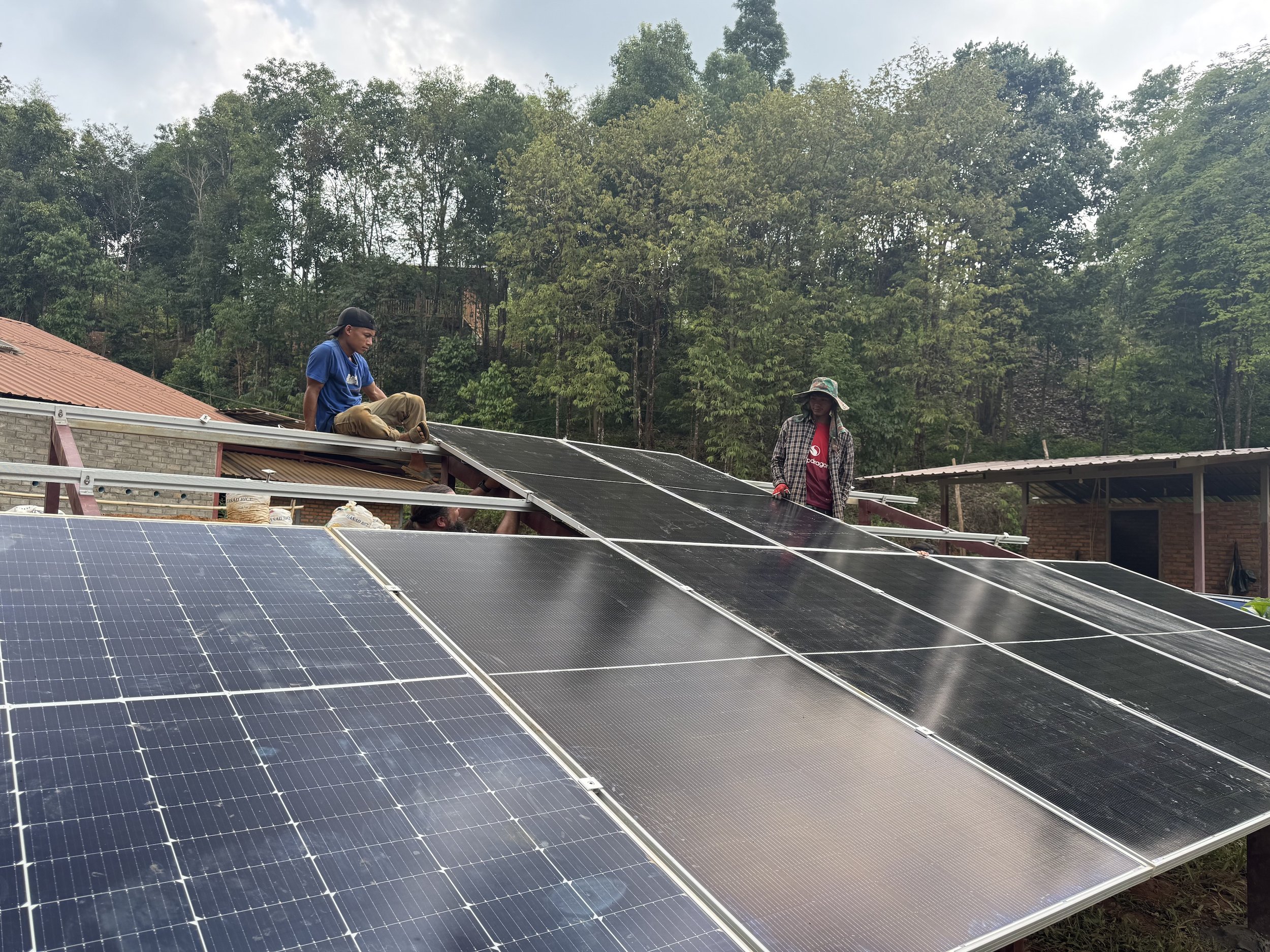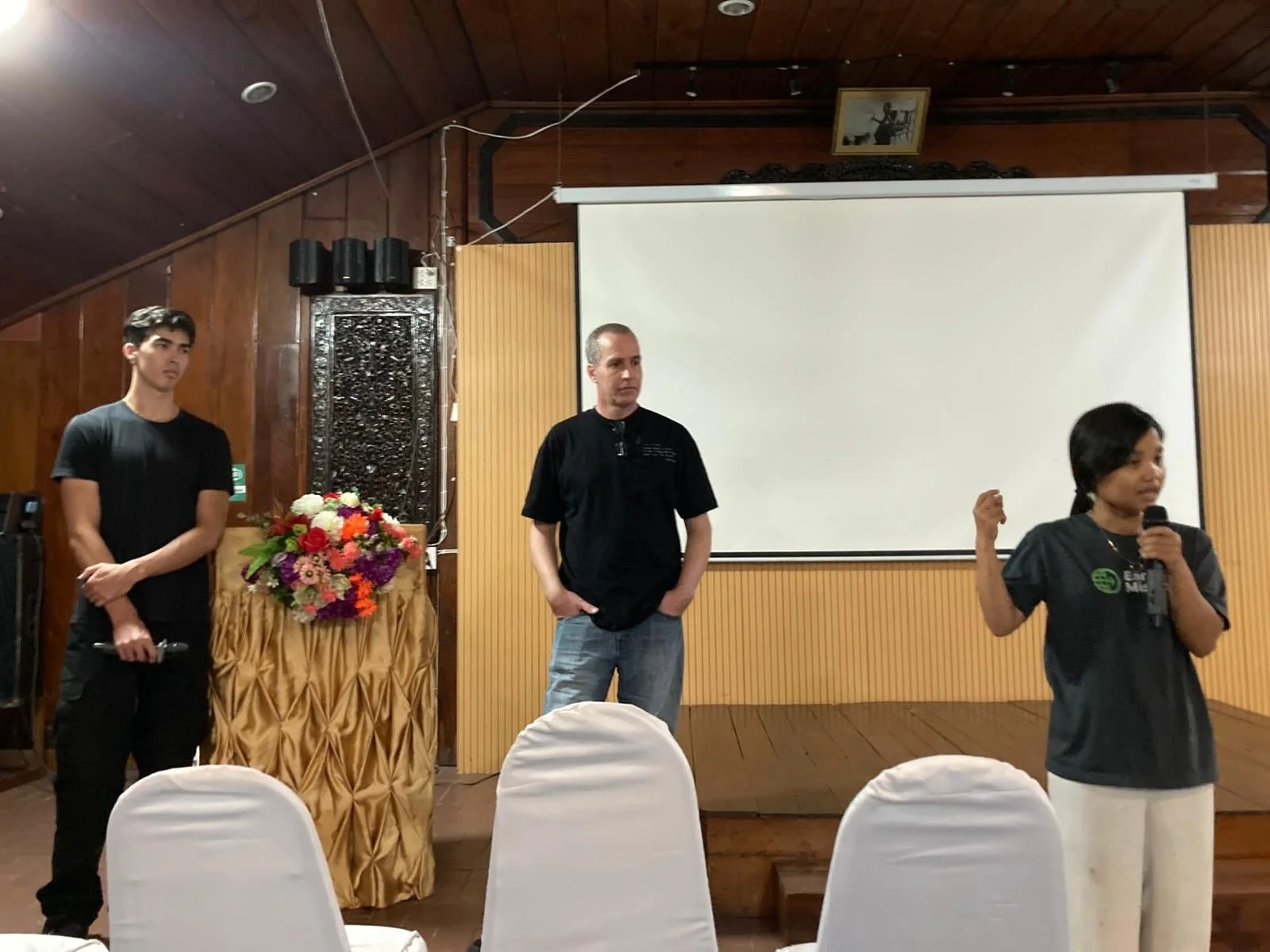From the Field
A PA Student’s Personal Experience
Our five-year PA training program produces well-trained graduates who are equipped to provide excellent health care to the most needy in the most difficult conditions. Naw Eh Sel Gay, Year 5 PA Student, recently completed her internship at a local clinic:
For my PA internship, I was placed at TBB Clinic—a small backpack clinic in the remote mountains of the K5 area—with my classmate Chu Dee Wah and Htoo Gay Paw. When we arrived, the clinic was almost empty. Medicines were scarce, and only two patients came during our first week. But once people heard that Physician Associate students from Rain Tree Clinic (RTC) were there, the number quickly grew to over 10 patients a day.
One medic and Community Health Worker (CHW) staffed the clinic, but we saw that they needed our assistance to better train them. Many tools and medicines were unused or misused due to a lack of proper training. Equipment like delivery kits had never been used properly. Some instruments were even rusty. We cleaned them in the river with sand and soap, sterilized them in an autoclave, and reorganized the sets. We also taught the staff how to handle sterile tools and gauze to prevent infections.
The pharmacy was another issue—medicines were scattered, and expired drugs were mixed in with the good ones. We sorted and labeled everything clearly, explained how to use lesser-known medications, and gave tips on daily sanitation and waste management.
This experience taught me that having equipment isn't enough—knowing how to use and care for the equipment is vital. Simple cleaning methods and strong teamwork can make a big difference, even in low-resource settings. Most of all, I realized that proper sterilization isn’t just a health procedure—it’s a form of respect for every patient we serve.
I’m especially grateful to our instructor, Senior Nurse Hsar Eh Wah, whose training in sterilization and pharmacy management truly prepared us for this internship and future challenges.
Pray for these Year 5 PA students as they finish their last year of the PA program.
PA PROGRAM // Training and curricula by year
Year 1 students are building the foundation for their medical education with classes on critical thinking, basic math, practical English, chemistry and biology.
Year 2 students are in classes for shortness of breath, chest pain, clinical lab, and pharmacology, and have review exams in cough and fever.
Year 3 students are in their practical skills lab and advanced laboratory teaching, plus classes and exams in normal labor, hypertension in pregnancy, and eye problems.
Year 4 students are learning ultrasonography theory and practice using SonoSim, a laptop-based ultrasound training tool with over 85 courses. Divided into four groups, they share two probes for hands-on practice.
Year 5 students returned from their internships on May 16. Now they are taking classes on anesthesia and public health while caring for patients and assisting in surgeries.
Postgraduate PA students are PA graduates and staff who want to continue their medical education. Dr. Augustine and Dr. Zue developed the Surgical PA and Internal Medicine PA trainings, which are offered twice per week and include lectures as well as practical experience. There are 10 Surgical PA students and 4 Internal Medicine PA students.
E-TECH PROGRAM // The fuel to our operations
High-quality healthcare is our mission. In the jungles, this is only possible through training highly-capable E-Techs to build and sustain remote clinics.
Year 1 students began learning project management and electrical. They practiced teamwork and communication, learned about current, voltage, and resistance, and practiced using a multimeter.
In early May, Year 2 and Year 3 students took solar classes to learn calculating device power consumption, sizing solar panels, batteries, charge controllers, and inverters, and distinguishing AC from DC power. They studied wiring diagrams and designed solar systems for homes, clinics, or classrooms in remote areas. Students practiced drawing layouts, calculating loads, and selecting components. They then installed the OPD solar array, building the frame, wiring panels in series and parallel, connecting to the charge controller and inverter, and testing for safe, proper operation.
On May 15th, Year 2 students traveled to Mae Sariang to continue studies in mechanics—hands-on practice with tools and machines—and project management—how to manage time, tasks, and materials in a project. Meanwhile, Year 3 students stayed at RTC to finish construction of the preschool building and the village toilet. They worked on painting, installing windows and doors, and cleaning the worksite.
RAIN TREE CLINIC // Pray for protection
Security Update
Jets are flying over our campus regularly. Everyone is on high alert. As precautionary measures, temporary bamboo buildings are being built and spread out across campus to house our inpatients, outpatients, and surgeries.
This daily danger was illustrated on May 25. Several hours away from our hospital campus, a Burma Army jet dropped a cluster bomb on a wedding ceremony. The bride was killed. Seven patients were brought to RTC, arriving in the dark and the rain. One patient died on the way. One was sent to Thailand with leg fractures. Two patients underwent surgery—one for a below-elbow amputation and one for an abdomen injury. The other three were treated for injuries with wound care and debridement. Pray for these families affected by this tragedy. Pray for safety for our staff, students, and patients. Pray for the war to stop.
New Buildings
We are nearing completion on several projects that will greatly enhance our operations:
The medicine storeroom, physician’s house, and preschool building are almost complete.
We are still working on bamboo utility buildings for electricity and water to spread out the hospital and campus.
Our Natural Farming School is constructing a multipurpose building to service classes and the office.
New Opportunities
As RTC grows, so do the opportunities to support our staff and students:
Preschool: With so many children of staff and patients staying on campus, our staff started a preschool to invest in these little ones. One teacher has been hired to supplement three current staff who had been teaching in their free time. There are 11 students ages 2-4 years and 3 students age 5 and above. The children study their local Karen and Burmese languages, along with English, math, and other activities.
Natural Farming School: What grew out of a need to increase and diversify and food sources for our growing hospital campus has become the Natural Farming School. With two new staff (a manager and a gardener/dorm parent/teaching assistant), our first class of students is learning the best ways to grow food in this environment. Foods such as rice, jackfruit, bananas, and pumpkins are being planted, and pigs and ducks are being raised.
In the thick of rainy season where muddy roads are impassable by trucks, motorcycle travel is difficult, and foot travel is slow—patients continue to find their way to the Rain Tree Clinic.
In May, RTC saw 469 outpatients, admitted 125 patients, performed 54 surgeries, and delivered six babies. Seven patients were referred to Thailand for advanced care.
MOBILE KAREN SURGICAL HOSPITAL // Pray for strength and peace
In May, the MKSH team saw 102 outpatients, 16 inpatients, and 20 war-related injuries caused by mortar blasts and gunshots. There was also a victim of a bear attack. Three surgeries were performed for chest tube insertion, foreign body removal, and bomb-blast injury. Our surgical PAs are now rotating every two weeks since weekly travel is too difficult in the rainy season. Please pray for God’s strength and peace for all those affected by the war.
Update on Naw Gay
Keep praying for Naw Gay, a 26-year-old community healthcare worker who suffered severe burns to her face, head, arms, and legs in a firebomb airstrike. Her care requires advanced reconstructive surgery and long-term rehabilitation.
We asked people to step into Naw Gay’s story with us. Within just 2 days, the estimated initial treatment costs were met.
Next week she will travel to the top teaching hospital in Chiang Mai for assessment, treatment and rehab planning. We hope they will accept her case. We are also appealing to a few other organizations and companies for assistance. Currently she is walking with assistance and is able to communicate by writing.
Further funding for Naw Gay will go directly toward her long-term rehabilitation and ongoing care—often the hardest part to fund. So, we invite you to continue giving. This next stage is just as vital.
New Documentary // “Frontline Hospital”
Matt Blauer, a friend and independent filmmaker, has released his new documentary titled “Frontline Hospital.” The 28-minute film documents our own frontline team. Matt presented the film in Chiang Mai and Mae Sot this past month. Now, it’s available on his YouTube page:















